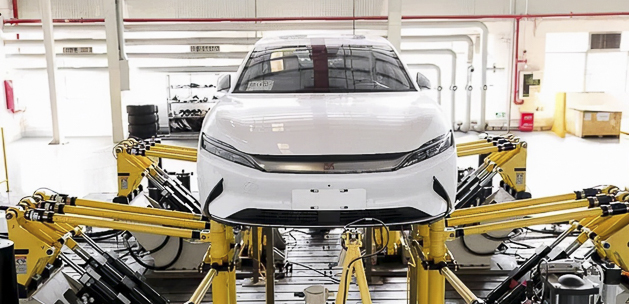Turmoil, threatened by zero COVID and its overnight termination, economic setbacks and war in Ukraine, has been averted over the course of Q1 2023. Relative stability was anchored by the Two Sessions, its announced outcomes and some diplomatic wins.
Top news includes Xi Jinping’s new leadership team, with Li Qiang 李强 taking the Premiership baton from Li Keqiang 李克强. However, the emergence of Cai Qi 蔡奇, a Politburo Standing Committee member, as director of the Central Committee’s General Office complicates this, raising questions about the actual chain of command among a dense network of Xi loyalists in the new team. This coincides with a major overhaul of the central bureaucracy (see below).
President Xi’s Middle East visit was acclaimed a triumph on the diplomatic front, with a ceasefire brokered between Iran and Saudi Arabia. The Saudi government, however, declined to move energy trade to a ‘petroyuan’ rather than a petrodollar basis. Xi's hugely hyped visit to Moscow resulted in a joint declaration signed with Putin. Still, his victory was yet again qualified, with their common ground largely confined to aversion to ‘US hegemony’.
The agency reshuffle detailed at the Two Sessions sets out a complete overhaul of scitech agencies underpinning the PRC's ambition to be a scientific powerhouse. A new Central Science and Technology Commission (CTSC) was revealed, virtually dismembering MoST (Ministry of Science and Technology). Reborn, MoST is charged with overall planning and oversight, no longer supervising specific research projects. This bid to firewall researcher autonomy comes as basic research once again tops the scitech agenda. A politburo study session on the topic (indicating whole-of-leadership attention) was held in late February. Wang Zhigang 王志刚, MoST minister, spoke several times over the month on the critical role of basic research.
MARA (Ministry of Agriculture and Rural Affairs) comes out on top at the Sessions: now charged with oversight of ag R&D replacing MoST. The China Rural Technology Development Centre, responsible for rolling out R&D initiatives subsidised by the central budget, will now operate under MARA, which merges with the former National Rural Revitalisation Administration, expanding its remit.
Back on the farm, rumours are rife of a new African swine fever outbreak across 17 provinces. An independent consultant suggests it might affect up to half the herd. Official data on outbreaks are no longer released.
Falling on the low side of expectations, the 2023 Two Sessions set a GDP target of ‘around 5 percent’. The modest forecast, coupled with moderate fiscal targets, signals Beijing’s hopes, post-zero COVID, that consumer demand will drive the economy in 2023.
Promising more impact than the GDP target was the reshuffling of financial agencies. In a bid to plug regulatory gaps, the China Banking and Insurance Regulatory Commission will be upgraded to cover a bigger spread of the financial action. Stepping up scrutiny of local financial dealings is another focus for Beijing, revamping offices of central regulators in localities.
A refreshed trade agenda was launched at the Sessions, spicing up ties with partner states in the Belt and Road Initiative as Beijing bids to retain the factory, indeed the advanced factory, of the world. Exports will be supported, and pilot free trade zones will be more prominent in the reform process. Yet trade growth remains sluggish and geopolitical tensions show few signs of letting up. ‘Self-reliance’ and ‘dual circulation’ hence remain key talking points. SOEs will assume more social and economic obligations. Industrial policy must support sectors critical to national economic security, making vital tech breakthroughs and going green.
To support this agenda, Beijing is stepping up educational initiatives to boost industrial innovation and tech self-reliance. Setting up independent schools in selected universities to serve ‘strategic emerging industries’—AI, robotics and advanced manufacturing—forms part of the centre’s efforts. Vocational training continues to seek partnerships between schools and business.
Support for the private economy is pledged by the Supreme People's Court and Supreme People's Procuratorate. Their Two Sessions’ commitment will see steps taken to reinforce private firms and entrepreneurs. Improving corporate criminal compliance is one such measure. Anti-monopoly measures, too, may be relaxed, freeing up space for firms to develop.
A new round of judicial reform is in train. Progress, it is claimed, will be made in building smart courts and rolling out a digital procuratorial strategy. The procuratorates (comparable to public prosecutors) may see a further expansion of their powers, led by Ying Yong 应勇, the new prosecutor-general, affiliated to Xi’s ‘Zhejiang Army’.
Priority areas in the energy and environment sectors were set out at the Two Sessions. Foremost is continuing to roll out renewables while using ‘clean and efficient’ coal power. Stress is also placed on ensuring energy efficiency and expanding carbon market trading. Worried about the likely impacts of the EU carbon tariff, planners raised it for discussion at the WTO.
Addressing shortages and weak trading activity, new allocations were issued for the national carbon market; greater leniency will be afforded to key emitters who exceed their carbon emission allowances. Another focus is boosting the green power trading scheme. Meanwhile, in line with growing domestic demand and building clean energy in rural areas, a new pilot scheme emerged, boosting renewables, not least distributed wind and solar.
An eighth round of centralised procurement of drugs and medical supplies launched on 1 March, covering some 40 product categories. In addition, provincial bulk-buying plans for the first time include TCM (traditional Chinese medicine), a move likely to reshape the TCM sector under the competitive bidding scheme.
